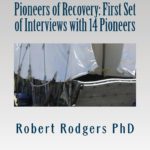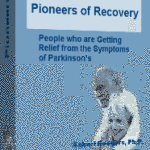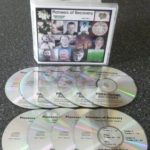People Who Discovered Natural Treatments for Parkinson’s Disease
|
Pioneers of Recovery is a 364 page book that reviews natural treatments for Parkinson’s. It includes 14 interviews (32 pages of questions in the Table of Contents, a 20 page index of 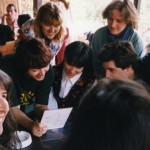 terms) that include edited transcriptions of interviews with seven (7) pioneers.
terms) that include edited transcriptions of interviews with seven (7) pioneers.
Seven interviews are with individuals who are experts in their respective fields and have considerable insight into natural treatments for Parkinson’s. The second set of seven interviews are with persons who actually have the symptoms of Parkinson’s and are exploring a wide variety of alternative (and mainstream) approaches to feel better.
Each person has a unique story, but each story is packed with hope and promise for a better tomorrow. Of course, recovery can be slow and frustrating, but the stories reveal an indisputable truth. A little experimentation and courage goes a long way.
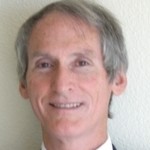 I became so curious about whether people ever recover from Parkinson’s that I decided to research the subject. Most people believe that recovery from Parkinson’s is impossible. My research shows this universally expressed judgment is false.
I became so curious about whether people ever recover from Parkinson’s that I decided to research the subject. Most people believe that recovery from Parkinson’s is impossible. My research shows this universally expressed judgment is false.
People everywhere are finding fascinating and effective ways to get good relief from their symptoms. Some people are symptom free today – not many – but some. There is hope, especially when you see what smart things people with Parkinson’s are doing for themselves to feel better.
The temptation was just too great. I began interviewing guests on the Parkinsons Recovery Radio Show so I could document their stories. Many people wanted to read the interviews so I decided to transcribe them.
The individuals I interviewed this book are true pioneers. They refuse to believe that recovery is impossible. All discovered ways to get great relief from their symptoms using a wide variety of approaches, treatments and therapies.
Let me be clear here. They are not getting worse. They are feeling better. Two of the people I interview are symptom free today.
The pioneers I interviewed talk about the therapies, approaches and modalities that help them feel a lot better. I also interviewed and documented the stories of health care experts who offer fresh and exciting ideas about what people with Parkinson’s are doing for themselves to get great relief from their symptoms.
It is an honor and privilege for me to release the stories of these 14 amazing pioneers. These are exciting times. Their answers to my questions clearly demonstrate that there is hope of recovery for anyone who currently experiences the symptoms of Parkinson’s.
| “I’ve had to do some dancing in PatientsLikeMe.com posts because I was lauding your work while I had been, in general, putting down individual alternative therapies…One major reason why I have criticized many alternative therapies is that so many “pitch” something like “I have THE ANSWER to ALL your cosmic questions!” and/or “I have THE CURE!” (sigh)…You can quote me on this, too, should the mood strike: Your work seems to have followed a path that, while “alternative,” follows principles of intellectual honesty, fairness and balance in the compilation of theories and practices of dealing with PD symptoms.
Anyway, on patientslikeme.com you will probably find me “dancing” as a result of the tension of being caught between my general put-downs of alternatives that claim to have THE CURE and my touting of your work…(again, a sigh).” Stan |
|
Dear Robert, “Thank you for your wonderful encouraging letters. I got the book Pioneers of Recovery. It is very positive, has helpful information and surely is worth of purchasing. I started to use passionflower drops in a glass of water (10 drops three times / day) – it does help with tremors. I also made massage oil for same using frankincense drops; one drop / 1cc of carrier oil ( I use almond oil) – I use it on my neck and arm – it helps. I also use Magnesium powder. I learned all that from your book. I just studied it a bit more. I am on my way to recover, next step is to detox and get Aquas… In addition, of course, I use your meditation CDs every day – They are very helpful, issues that I had forgotten come out. Again, Thank you!! TV, Vancouver, BC, Canada
|
My Passion for the Pioneers of Recovery Project
I have been awestruck by the pessimism that pervades talk about Parkinson’s disease. Every where you look, you see predictions of gloom and doom. People with Parkinson’s presumably have no possibility of recovering.
My intuitive sense told me that this could not be true. As a researcher, I decided it was high time to prove it. What better way to dispel a myth than to bring clear and convincing evidence about natural treatments for Parkinson’s that have succeeded.
I do not deny for a minute that the pessimistic belief that Parkinson’s Disease is “degenerative” and “progressive” is held in the minds and hearts of millions. I also know that if people believe this to be true, it will become true in fact. Thoughts are the most powerful force in the universe.
My passion is to manifest a new belief template for the world. It is possible to recover from Parkinson’s. It will happen when you believe this to be true.
There is no single answer nor will there be a single answer tomorrow. There is no “cure.” But, there are many, many activities and approaches that can help and make a huge difference.
The pioneers I interviewed are courageous people who have embraced the true belief that recovery is possible. Better yet, they are doing it in their own way and time. Each story is remarkable. I am privileged to have the honor of documenting their stories.
Read this remarkable book that documents the stories of recovery and …
-
- Discover herbs that can help with specific symptoms –Andrew Bentley is a herbalist who is getting great results with his Parkinson’s clients. Andrew talks about specific herbs he uses for very specific symptoms like tremors, rigidity and excessive salivation. What he is doing for his own clients will help revolutionize how Parkinson’s is treated.
- Explore the healing power of essential oils – What are essential oils and how can they help you? Jean Oswald answers these questions for us. She offers specific recommendations about the type of essential oil that can help relieve specific symptoms.
- Find the amazing stories of people with Parkinson’s who are feeling better – Seven of the 14 interviews are with persons who have been diagnosed with Parkinson’s. Each story is unique. Each person is doing something different to feel better. Each story is packed with hope that relief is possible for anyone.
- Celebrate what two people with Parkinson’s have done for themselves to become symptoms free today – John Coleman is a naturopath doctor who is symptom free today. He now helps others recover. John talks about his own recovery and what he found to be most useful. Nathan Zakheim had an advanced stage of Parkinsons and was a few months shy of having to live in a nursing home. Nathan too is symptom free today. He also talks about what he did to recover.
- Receive a detailed explanation of therapies that help people feel better – There is no single therapy or approach that is the panacea. People have discovered many therapies and approaches that are effective.You will find in Pioneers of Recovery: First Set of Interviews with 14 Pioneers detailed information about the therapies that have helped the pioneers feel better.
- Obtain contact information of the health care providers. Each of the health care experts provides detailed contact information. You can get in touch with them if you are interested in learning more.
- Gain an understanding of therapies that unlock unconscious resistance to healing – Sometimes part of us wants to heal, but another part resists healing. I found several people to interview – a psychologist and a international expert in Neuro-Linguistic Programming – who offer exciting ideas to help unlock any unconscious resistance to taking the steps that are necessary to recover.
- Realize how a famous comedian and juggler maintains focus, harmony and balance while he juggles. – Chris Bliss is famous for many reasons, but he is probably most famous for a 5 minute juggling act that has been seen by over 40 million people on the internet. Chris talks about how he goes about maintaining a healthy sense of balance in his life and during his juggling act which has profound implications for Parkinson’s.
| “In one of the Pioneers of Recovery interviews, your guest is recommending a new formula of Glutathione. I’ve tried this Liposomal Glutathione now for 3 weeks with great results. After 1st time taking it, immediately my energy level has doubled, my mind got much clearer, the off period is reduced and I feel very relaxed. It feels like going back from stage 3.5 to stage 2 on the PD scale.”Sugit |
Why not benefit from the experiences of other people with Parkinson’s who have experimented with a variety of therapies, approaches and modalities? I can guarantee you that you will find suggestions and possibilities here that you have never seen or heard about. I have been doing research on Parkinson’s for over a decade and I have never heard or seen many of the suggestions you will see in Pioneers of Recovery.
-
-
- Herbs can make a huge difference. Find out which ones are helpful and for which symptoms.
- Essential oils can provide welcome relief from specific symptoms. Learn about which ones make the difference for which symptoms.
- Do you suspect you have unconscious resistance to launching an authentic program of recovery for yourself? Discover what a psychologist and a neuro-linguistic specialist recommend is helpful for people with Parkinson’s.
- Have you ever wondered whether physical therapy can be of any help? Read what a physical therapist has to recommend who works with people with Parkinson’s every day.
- You have probably heard rumors about people with Parkinson’s who are feeling better. Ever wondered what they did to make this happen?
-
There is no consistent pattern to the stories. No universal “truths” of recovery are revealed. Each story is unique and special. There are gems in each person’s story that have the potential to be of enormous help to anyone who has the symptoms of Parkinson’s today.
I am amazed at how many websites exist that offer the promise of a “cure” for Parkinson’s. It is especially tough for me to sort through the scam artists from the sages.
Pioneers of Recovery is a compendium of authentic transcriptions and audios of interviews with real people. You can contact all seven experts directly. There is also contact information for two of the persons I interviewed who have the symptoms of Parkinson’s. The other five interviewees elected to be anonymous.
There are internet websites that make claims of amazing cures for one therapy or another, but they never document the “cures.” Pioneers of Recovery is not about revealing any “cures” or promoting any particular therapy or treatment. Rather, you will find in the book invaluable information and contacts that can give you a jump start on your own recovery program.
Listen to your own intuition as you get some great suggestions in Pioneers of Recovery that can jump start your own path to healing.
Pioneers of Recovery Delivered in Three Formats
There are three choices described below for how you can access the remarkable information contained in this set of interviews with seven Pioneers of Recovery and seven experts: First Set of Interviews with 14 Pioneers. (1) a PDF download to your computer, (2) a paperback book available from Amazon that you can hold in your hands and (3) audio recordings of the interviews which are available as CDs and MP3 downloads.
All orders will show up on your credit card under Zero Point Healers which is the LLC for Parkinsons Recovery
Download to Your Computer
When you order a download of Pioneers of Recovery: First Set of Interviews with 14 Pioneers you will receive an instant download to your computer of the 364 page book that can be reviewed immediately and saved to a folder in your computer for review later. The best part of a PDF download is that you can read the book on your computer (or other portable device) in just a few minutes from now. The download contains links throughout which you can access to obtain additional information and resources about the topics that are covered. There is no need to wait for the mail carrier to show up at the mail box next week and no need to pay for shipping. Click “Add to Shopping Cart” to claim the download.
Paperback
The paperback of Pioneers of Recovery: First Set of Interviews with 14 Pioneers (seven are interviews with pioneers and seven are interviews with experts on recovery) can be ordered from Amazon by clicking on the book cover below:
Audio Recordings
Audio recordings contain 8.8 hours or 530 minutes of interviews with the 14 Pioneers of Recovery. Recordings of the interviews have been professionally mastered to make listening carefree. Audio Recordings of the interviews are available in two formats: a set of 9 CDs (which have to be shipped and MP3 audio downloads to your computer (which can be accessed immediately).
Nine (9) Compact Disks (CDs) contain audio recordings of interviews with the 14 pioneers. The cost of $40 translates into a cost per CD of only $4.44. The nine CDs are shipped to US destinations for free and to all destinations outside the United States for $30.
 MP3 Audio Recording Downloads To Your Computer. Downloads are delivered to your email immediately after processing your order.
MP3 Audio Recording Downloads To Your Computer. Downloads are delivered to your email immediately after processing your order.
30.00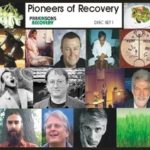
What Questions are Answered by the Pioneers?
What follows are samples of questions I asked of each interviewee. Pioneers of Recovery is a transcription of the answers, so you can rest assured that the answers have not been massaged or altered or modified in any way.
Each person I interviewed read and edited the transcript of their interview, so what you see is what the person really said and what they really meant, not my interpretation of what they said or meant.
Sample of Questions that I asked the experts:
Andrew Bentley – Herbalist
-
-
- What does a herbalist do for people?
- What herbs in your past experience are helpful for people who have central nervous system challenges?
- If a person came in and had a dominate tremor, that would inform a certain set of herbs or
 maybe just one dominate herb versus if someone came in with a dominate symptom of pain and rigidity, that would inform a different recommendation of herbs?
maybe just one dominate herb versus if someone came in with a dominate symptom of pain and rigidity, that would inform a different recommendation of herbs? - Many people ask me a question about excessive salivation. Is there anything you would suggest as a possibility in the herbal area for that?
- What would be recommendations for a person who presents depression as a primary symptom?
- Could you talk about your experience with people who have the symptoms of Parkinsons and how these herbs have helped them?
- It sounds like for the people with Parkinson’s that you have seen the results are indeed encouraging. People are seeing relief from their symptoms. You offer hope that there are people who have become virtually symptom free – maybe not totally – but virtually symptom free. Do I understand that correctly? Is that what you said?
- One specific herb that I do not think you have mentioned (and what many people are interested in is called Mucuna.
Many people have been acquiring that from India as a dopamine supplement. Do you prescribe mucuna for your patients?
-
Carl Buchheit – Neuro-Linguistic Programming (NLP)
-
-
- Can NLP be useful to persons who have the symptoms of Parkinson’s?
- One of the common symptoms of Parkinson’s is anxiety. If a person were to focus on a specific

event or events that create the anxiety, then would it be possible working with an NLP therapist to find quick relief from that anxiety? - You mentioned some of the misinformation on the internet about NLP. Do you have other books or tapes or CD’s that you would recommend people might look at to find out more about NLP?
- There are many people that believe once they are diagnosed with Parkinson’s they are always going to get worse. From my understanding of what you have said, you have worked with individuals with Parkinson’s who have gotten better. Is that correct?
-
Chris Bliss – Comedian, Juggler
-
-
- When you are juggling and when you are in that place of perfect balance and harmony, hat does it feel like?
- In your shows you do both the comedy and juggling. As I understand it, what you are saying is
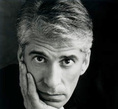 that many times that place of perfect harmony and balance is actually present when you are doing both, not just when you are juggling?
that many times that place of perfect harmony and balance is actually present when you are doing both, not just when you are juggling? - For people with the symptoms of Parkinsons fear and tress are huge issues. When fear and stress are up, symptoms flare. Do you ever feel fearful or stress when you are juggling? How do you get yourself out of being in fear when fear rolls in while you are performing, if it ever does?
- People with Parkinsons who are finding ways to feel better tell me that there are certain things that help them feel more in balance. I want to ask you if you do these things.
- Many who have the symptoms of Parkinson’s tell me they are very careful about making sure they are properly hydrated, that they drink enough water. Is that anything that is conscious for you?
- People also tell me they have various ways they relieve stress. Everybody faces stress every day. One of the ways to release stress is humor. Is humor one of the biggest ways you relieve your own stress?
- A number of people have told me that they have had great relief from their symptoms because they have such strong support systems and support networks. Yet, you are often traveling. You are all over the place. Do you have a strong social network or support system for yourself?
- What practical suggestions do you have for people who are trying to live their lives in that very same space you are in when you are juggling?
-
Jean Oswald, R.N., CCA – Aromatherapist
-
-
- When I use the term “essential oils” what is that exactly? What is an essential oil?
- How would I know what type of essential oil will help me? For example, if my symptoms are tremors and rigidity, are there specific essential oils that can help offer me some relief from my
 symptoms?
symptoms? - Has there been research to evaluate the impact of essential oils?
- What if an individual has problems with muscle rigidity and it is very difficult for them to move with ease. What is an essential oil that might help relieve that particular symptom?
- How about the problem of tremors? What essential oils might be recommended to relieve that symptom?
- A problem some people have is with excessive salivation. Are there any essential oils that come to mind specifically for that symptom?
- How about insomnia?
- Many people I interview talk quite extensively about stress and how that affects them. When they are under extreme stress their symptoms flare up. Can essential oils address the problems that stress creates?
- There are some reports that pathogens and bacterial infections confound the symptoms of Parkinson’s. Do essential oils have the potential to address those pathogens?
-
Lisa Brown – Physical Therapist
-
-
- If I am a person who has had these challenges, when I go to you is it a question of your moving my arms and legs around so that they are more flexible or do you work with me in terms of helping me how to walk?
- A lot of people you see have had difficulty with falls or other problems. Is there any reason why a person who is first diagnosed with the symptoms of Parkinson’s should come to you in the very beginning?
- When a person comes to see you is it likely that they will get a relief from symptoms and feel better or are they going to feel worse?
- You have extensive experience working with persons who have Parkinson’s. Do you have an exercise protocol that you give to people that you recommend everybody does or is the work you do very specific to the person’s needs?
- What would you say is the most important thing for persons with Parkinson’s to know about movement and about flexibility? What would you want them to know would be most important?
-
Steve Fenwick, Ph.D. – Psychologist
-
-
- What often happens then is that when a person comes to see you, they will come with a dream and you will help them sort through what that dream means?
- Let’s say a person with the symptoms of Parkinson’s is shaking or tremoring. What might be an interpretation that is possible of the shaking or tremoring in the context of the person’s entire
 life?
life? - Let’s say I had Parkinson’s and I came to you. We begin to work together and the approach is to help me exaggerate my symptoms which is tremoring of my hand. Am I going to have certain thoughts that I didn’t expect? Will I have certain feelings that I didn’t expect or revelations? What is likely to happen?
- How might people with Parkinson’s be helped if they do Process Work? Is it going to be connected somehow with being able to get some relief from their symptoms and feeling better?
-
John Coleman, ND – Naturopath
-
-
- How did you come to the realization you could get better when all indications were that you would get worse?
- There is so much information out there about what is supposed to help – vitamins, supplements, body therapies, etc. etc. How did you go about deciding what to try in terms of
 therapies, supplements, doctors, etc.?
therapies, supplements, doctors, etc.? - Which therapies/approaches did not work for you?
- What has helped you get the most relief from your own symptoms?
- Is there anything in particular that you recommend for the symptoms of:
-
- Pain
- Inability to sleep
- Constipation
- Tremors
- What was recovery like for you?
- What about your patients… what has their experience been like?
- Among your patients with Parkinson’s, how many are getting relief
from their symptoms? How many have been able to see full relief from
their symptoms? - Does a person have to make any lifestyle changes to recover?
- It took you three and a half years to recover. That is a long time to sustain hope. How did you do it?
- How can I reduce or manage my rigidity, spasms and burning sensations?
- When should we start taking medication?
- Could you discuss the approaches using the Emotional Freedom Technique for my Parkinson’s condition and your opinion of the value of the technique?
- How long did it take you see substantial symptom relief? How long did it take to become symptom free?
Sample of questions asked of persons who have been diagnosed with Parkinson’s
Max
- Can you talk a little bit about the detoxing work that you have done and the Ayurvedic work?
- Is it hard to stick to a diet?
- Your experience varies from day to day? Every day is a new experience?
- You notice a very strong, direct relationship between stress and the symptoms?
- What types of things do you do other than all the meds to be able to release some of that stress that you’re under?
- If there is one thing you would say about what’s helped you the most to be able to feel better and get relief from your symptoms, what would it be? What would you tell people they really should do, whatever it may be?
Sandy
- What are some of the struggles you have had with Parkinson’s? Are you taking traditional medications?
- Do you take other supplements or herbs or vitamins?
- What are some of the things you do to help you feel better?
- You have really been able to continue doing all the things you have always done without much interruption?
- I am sure there are modalities, therapies and approaches that you have tried since you have had Parkinson’s that really did not offer much help. Could you talk about those?
- What about other approaches, therapies and modalities that you have tried that have offered you some relief and have helped you feel better?
- When you say they tested you for lead and mercury, was this with saliva or blood or hair samples or …? How did the test actually work?
- Many believe once you begin to have the symptoms of Parkinson’s you are always going to get worse and feel worse. From what you have described it sounds like that really has not happened for you. Is that right?
- When tension comes up what happens when you choose to exercise rather than relax?
- Do the symptoms get better when you exercise?
Stan
- We are all interested to know what you have tried, what has worked and what has not. Could you talk a bit about what your experience has been?
- When you talk about meditation could you possibly say a little more about specifically what type of meditative approach works best for you?
- Do you notice when you do this meditative technique that there is a relief in symptoms?
- What other approaches or natural therapy do you use that you find gives you relief of your symptoms?
- Are there any dietary concerns that you have or that you would like other people to know about that seem to make a difference?
- So what about exercise? Do you notice any connection between activity, exercise and feeling better?
- What would you want to say to someone who has just heard the news that they have Parkinson’s?
- Over the course of the period that you have had the symptoms, it sounds like what you have been able to do is to find a number of ways to get relief as those symptoms begin to flare up?
Mary
- What you have been doing to get relief from your symptoms?
- What about craniosacral work?
- You have done so many therapies and tried so many things. Some of them haven’t helped and some of them have. Are you getting better?
- Is there anything that you would want to be sure and say to a person who is just been diagnosed with Parkinson’s?
- About how much time everyday or every week do you spend on your exercise program?
- You definitely notice a difference? When you exercise you feel better and when you don’t exercise you feel worse?
Nathan
- Tell us who you are and what your story is in terms of having had Parkinson’s and being able to recover.
- You mentioned that a lot of the work that you were doing was challenging. After you were able to recover, were you able to go back full steam into doing work and other kind of activities?
- What would you say to somebody who has just been diagnosed with Parkinson’s?
- Are you in contact with or do you know many other people whose story is similar to yours – people who had Parkinson and have been able to get relief from their symptoms?
- Could you summarize for people, from just your own experience and observations of others, what is it that happens to others who do not recover – who are not able to feel better?
- You’ve also described your own recovery is not exactly a smooth ride up. Are there some rocky spots on the path to recovery?
- What do you have to do to help your body detox?
Carl
- What generally did the doctors recommend would be a good path to pursue?
- Can you talk a bit about exactly what you’re doing now? Are you still doing the craniosacral therapy?
- Are you taking supplements of one kind or another?
- Are there any dietary rules that you have for yourself that are important?
- What would you say to anyone who’s just discovered that they’ve been diagnosed with Parkinson’s? What kind of help, insight or comments would you want them to hear?
- Is there anything that you’ve regretted doing? Or trying?
Taube
- So, you’ve responded by getting a lot of good medical advice and attention. What other kinds of things have you done in response to this medical challenge?
- What do you suppose might have been the contributing factors that created the symptoms for you?
- You’re out there exploring and experimenting and have quite fascinating
experiences. For a person that might first be discovering that they have the symptoms of Parkinson’s, what would you want to say to them? What advice would you give to them? - When you say you do eat well, could you provide any specifics on that? I mean, steak, mashed potatoes, french fries, milkshakes? What is it that you like to eat? What do you try to avoid?
- Did you get some relief from your symptoms after attending Hypocrates? Have you been able to keep up with the dietary regimen?
- When you are eating food that your body needs and loves you feel better, so that is a motivator in itself?
Unique Offering
Most of the books about Parkinson’s that are available to people interested in findings ways to get relief from their symptoms are small in size – only 100 to 200 pages. They present material that has been taken from the public domain. In other words, you can locate the same information in these books yourself if you are willing to take the time to find it on the internet or through library searches. You are simply paying someone else to assemble and organize the information for you.
The information you will read in Pioneers of Recovery can be found no where else on the internet or in libraries. It has been assembled from original interviews with 14 individuals who are true pioneers of recovery. The book reflects countless hours of original work and intensive efforts of many individuals. The information in this book has been assembled and organized to help people diagnosed with Parkinson’s disease find ways to get relief from their symptoms.
Why Delay Your Own Program of Recovery?
You can use some of the ideas in Pioneers of Recovery to launch your own personal program of recovery today. Quite frankly, I am truly amazed at how many genuinely rich and helpful ideas emerged from this work.
Working on publishing Pioneers of Recovery has been a true inspiration for me. Each of the 14 persons I interviewed are authentic pioneers who are paving a path for anyone who currently experiences the symptoms of Parkinson’s disease. It has been a privilege to work on this book project. I thank each person I interviewed for sharing their experience and wisdom.
Best of Success on your journey down the road to recovery,
© 2017 Parkinsons Recovery

